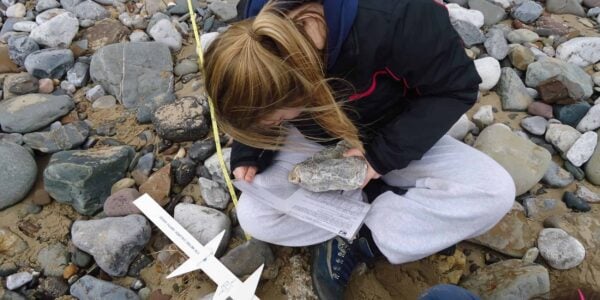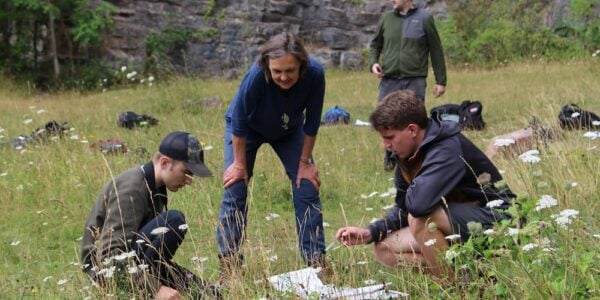This course provides an opportunity for schools with low student numbers to prepare, plan and collect data for their individual Non-Exam Assessment for A Level Geography.
Our geography courses offer:
- Subject content in a range of amazing fieldwork locations. In particular the course will cover both human and physical fieldwork aspects and can contribute to the minimum legal fieldwork requirements.
- Practical fieldwork skills and use of specialised equipment and techniques embedded into the days.
This set programme enables students to collect data for their A level Geography independent investigations that focus on aspects of Changing place in a rural setting or Landscape systems in a coastal landscape or Water cycle for any specification.
Slapton Ley Field Centre is located on the Start Bay coast in South Devon and is surrounded by Slapton Ley National Nature Reserve. The Ley is the largest natural freshwater lake in the South West and is separated from the sea by Slapton Sands, a barrier beach. The 214 hectare reserve has been managed by Slapton Ley for over 50 years as an “outdoor laboratory” for education and conservation, and boasts a rich mosaic of habitats including ancient and coppiced woodland, freshwater lake and stream, shingle ridge and rocky shore. The centre offers visitors of all ages the opportunity to experience a unique outdoor learning environment in combination with specialist teaching and facilities.
These courses are for groups of 9 or less students from any one school. Students must be accompanied by a responsible adult (usually a teacher from a school, but could be a parent/carer for an individual student).
The course price includes in-course transport, whilst at the centre, and is exempt from VAT.
Please bring your own packed lunch for the first day. All other meals are included up to a packed lunch on the last day.
Example Timetable
Day 1
Afternoon
Course starts at 1.30pm.
Arrive prior to this for show into accommodation, centre welcome and hire of waterproofs if required.
The Water Cycle
Students will explore the Slapton Ley catchment visiting a selection of appropriate fieldwork locations.
Students will be introduced to variety of quantitative and qualitative methods including:
- Infiltration
- Soil density
- Storm simulations
- Measuring interception
Evening
Evening Introduction
The evening will provide time to present and analyse the field data, including the use of geospatial technology as appropriate.
Students will be encouraged to make links to potential investigation questions and begin to consider ideas for their own independent enquiries.
Day 2
Morning and Afternoon
Rural Changing Places in Slapton and Totnes
Students will be introduced to fieldwork methods used to assess a rural area. Both qualitative and quantitative, primary and secondary data will be used. Techniques may include:
- Non-participant observations
- Environmental quality assessment
- Sound and smell mapping
- Pedestrian count
- Sphere of influence
- Index of decay
Evening
Methodology Workshop
Students will gain skills in how to critically evaluate and improve their methods. Different sampling strategies will be covered, as will how to choose an appropriate statistical test.
Day 3
Morning and Afternoon
Coastal Landscapes
Students will travel along the beautiful Start Bay coastline to gain an understanding of this coastal system, including its inputs, outputs, energy, stores and flows. Students will be introduced to quantitative and qualitative data techniques including:
- Beach profiles
- Sediment analysis including sediment size and shape
- Cost-benefit analysis, bipolar evaluation, flood-risk analysis
- Field sketch
- Hudson’s equation
Evening
Geography Fieldwork Investigation Planning
In this session students will be given time and resources to plan their own independent investigation. They will develop a title with an aim / question / hypothesis, plan their methodology and create their own data collection tables. Students will also have time to develop any digital data collection techniques and complete candidate record forms.
Day 4
Full Day
Independent Investigation Data Collection
Students will visit their chosen fieldwork locations to collect data for their independent investigation.
The follow-up session can provide time for students to begin to collate, process and write up their data as well as collect secondary data in the Slapton Research Library and from our online resources.
Day 5
Morning
Statistics Workshop
Students will be shown how to carry out statistical tests, including Spearman’s rank, chi-squared, Mann Whitney U and Student’s t-test.
Course finishes at 12.30 for departure around this time.
Please note that to ensure safe and quality learning experiences for students, the timetable may alter depending on weather conditions and tide times.
What's Included
Opportunities to attend this course
-
Mon 11, November 2024 14:00 - Fri 15, November 2024 12:30


